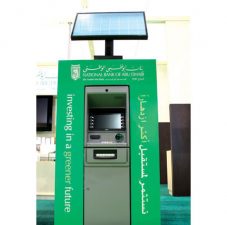 Today’s smart investors can tell you the difference between a seed bank and an investment bank.
Today’s smart investors can tell you the difference between a seed bank and an investment bank.
Eco banking, or green investing. It seems to have reached the top of its hype around 2008, or around the time when Coldplay said it would plant a tree for every album sold or downloaded. It was also around the time when the notion of carbon credits would work for our system –– that companies would pay others to make their businesses carbon neutral, and less damaging to the atmosphere by way of greenhouse has emissions.
But since then the topic has petered away. Did those trees that Coldplay planet ever grow? Who thought about the cost of maintaining those $1 trees every year? Then there was the catastrophic losses in clean tech investment, making cleantech a pariah for the has-beens or could have beens green energy companies. Solar energy investments tanked. Wind, ethanol and all the other promises made by a bandwagon of companies didn’t hold true, so investors held off.
Why did this happen? And what can we learn? Should all bets be off and business be as usual? Of course not! We can learn that the 2007 era was a time when companies were being built by stock brokers and hedge fund managers, many of them money men, hoping to cash in on the lucrative grants and feed-in tariff guarantees that governments and cities offered to help them go green. They had no clue about the environment on a deep level.
But the green or clean tech companies that survived until today are different. These ones are led by a more educated group of people who understand what triple bottom line means. They read books. They make news and they know who Rachel Carson is and they know what Cradle to Cradle means. Ask a solar energy/clean tech someone in the 2007, and you’d be surprised to see how little any of these guys knew about sustainability. I know because I was there. And I say guys because a strong majority of them were men. One company I interviewed didn’t know what greenhouse gases were. No joke.
But we shouldn’t throw the baby out with the bathwater. It’s 2017 and we are a lot smarter about investing today. But so are the companies changing our world for the good. We are also a lot smarter with technologies (like core banking) and the way we manage our portfolios.
According to numerous reports, including a recent one in Forbes, green or sustainable investing can help you meet your portfolio goals without sacrificing your bottom line return on investment. The investment magazine cites a newly published report from the US SIF (The Forum for Sustainable and Responsible Investment), which found that every dollar invested in sustainable, responsible and impact (SRI) assets – and that amounts to $8.72 trillion as of 2016 – is 33% higher than it was in 2014. What this means is that every $1 out of every $4.6 under professional money management in the US is now invested in SRI strategies.
This approach, the report concludes includes environmental, social and governance (ESG) factors or a mission in investing in sustainable areas. And being a part of this mission will not affect your returns. Here’s why. According to the Forbes’ article:
“Firms that pursue better ESG practices have higher quality management and better stock performance.
“Modern portfolio theory says that if an investor limits the pool of possible securities to choose from, the probability of maximizing returns for a given level of risk is reduced. But limiting the pool of possible securities based on ESG criteria has the opposite effect. The reason is that ESG criteria are key indicators of management quality, which helps avoid stock specific risk in a market with imperfect and asymmetric information.”
Other factors that mitigate risk is management quality and services. Today’s managers demand jobs with meaning and higher purpose which affects their operational efficiencies. They simply are motivated to make more money so they can keep making the world a better place. It’s motivating!
And the research coming out of academia supports this theory was well, including a 2014 paper from Oxford University that according to Forbes, “concluded that 90% of the studies demonstrated that sound sustainability standards lowered companies’ cost of capital, 80% of the studies observed that stock performance and good sustainability practices are positively correlated, and 88% of the studies showed that robust ESG practices improved companies’ operational performance.”





